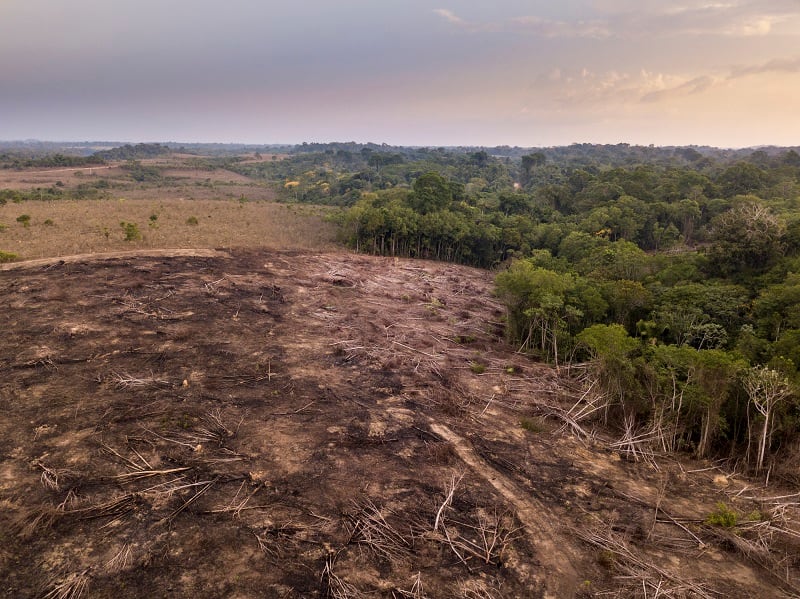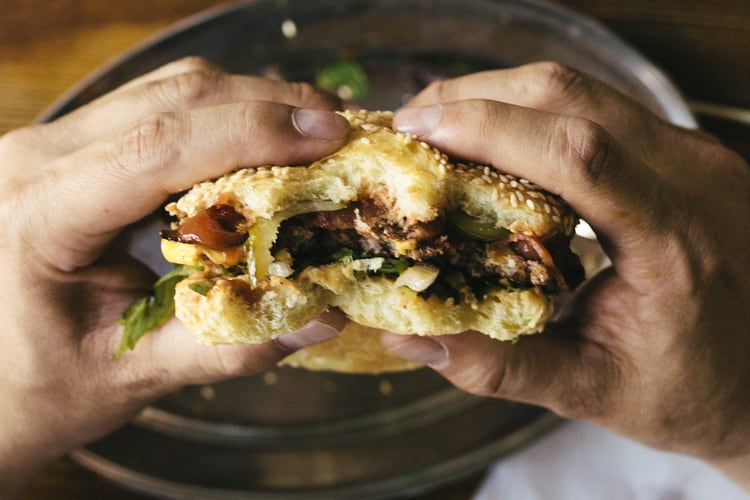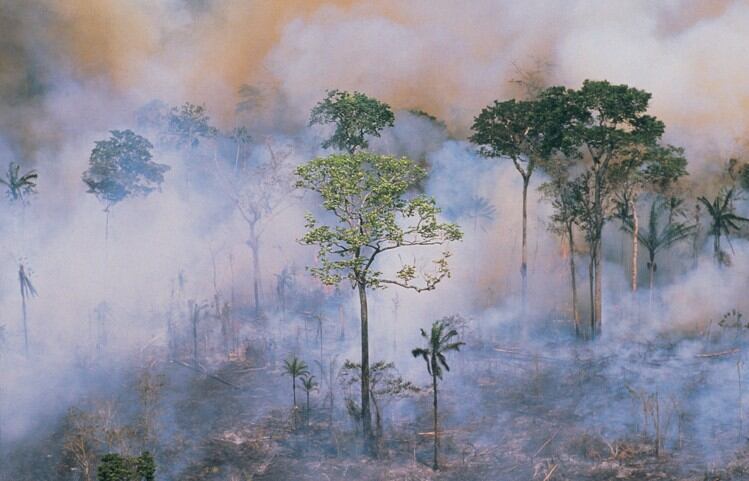It comes after new findings linked cattle production to deforestation in the Amazon, Cerrado and Pantanal.
The investigation by Repórter Brasil in partnership with campaigner Mighty Earth tracked deforestation-linked beef to European retail store shelves, in the form of beef jerky, corned beef and fresh prime cuts.
“This is a watershed moment because several huge supermarkets across Europe are saying an emphatic ‘No!’ to Brazilian beef over deforestation concerns,” said Mighty Earth Europe Director Nico Muzi. “This is not a vague commitment or a nice announcement that looks good in a press release. These are a series of concrete commercial actions taken by some of the biggest supermarkets in Europe to stop buying and selling beef from a company and a country that have made too many promises and have delivered too few results.”
“Christmas has come early for the forests in the Amazon, the Brazilian Cerrado savannahs and the Pantanal wetlands,” said Muzi.
The research claimed to find multiple examples of ‘cattle laundering’ – beef processed by JBS at its slaughterhouses in low-deforestation areas such as São Paulo, but sourced from cattle raised and fed on farms officially sanctioned – and embargoed – for illegal deforestation in the Amazon rainforest, or tied to destruction of the Cerrado woody savannah and the Pantanal tropical wetlands.
“The new research shows JBS continues to sell beef linked to deforestation, even though there are around 650 million hectares of land in Latin America where deforestation-free agricultural production is possible,” said Muzi. “The big news is that Europe is not buying it now. These commercial actions as well as new EU legislation to stamp out imported deforestation, show that the grip is tightening on forest destroyers.”
“In fact, based on today’s commitments, it looks like JBS’s irresponsible practices are causing major supermarkets and retailers to turn away not just from this one company, but from Brazil-sourced and even South American-sourced beef in general,” said Muzi. “If I was another beef company from that part of the world, I would urge JBS to stop making their entire region a deforestation-linked global pariah. Certainly, there are many companies in South America that do better.”
This past April, Mighty Earth released its newest analysis of deforestation data, which found that JBS was the worst-performing meatpacker. It has been linked to 100,000 hectares of clearance the past two years. Some 75 percent of this clearance occurred in protected areas, making it potentially illegal under Brazilian law.
Princes Group: “Princes has not placed a contract for corned beef from JBS since November 2020; the Princes branded corned beef sourced from JBS and identified by Mighty Earth on shelves in the UK and Netherlands will be residual sales from this last contract.
Princes takes the issue of deforestation very seriously and continually engages with suppliers to improve supply chain management, mitigate risks and enhance transparency. We have been reviewing our corned beef supply chain and are developing a new sourcing policy for Brazilian material taking into account a wide range of factors including traceability, risk, cost, quality, customer feedback, the management of indirect suppliers and a commitment to zero deforestation.”
The key commitments from Europe-based supermarkets announced:
- Ahold Delhaize – a Dutch food retail company with over 7,000 locations worldwide and revenue of €75 billion in 2020.
- Albert Heijn (part of Ahold Delhaize) committed to stop sourcing beef from Brazil for all of its stores. It is the largest supermarket chain in the Netherlands, with over 1,000 locations and a market share of 35% in 2020.
- Delhaize (part of Ahold Delhaize) committed to removing all Jack Link’s products from its shelves. The company is one of the largest supermarket chains in Belgium.
- Lidl Netherlands committed to stop selling all beef with South American origin as of January 2022. The company is part of Lidl Stiftung & Co. KG, a German retailer chain with over 11,000 locations worldwide and revenue of over USD$75 billion.
- Carrefour Belgium committed to stop selling Jack Link’s Beef Jerky in Belgium, and the larger Carrefour Group committed to increasing surveillance in all operating countries. Carrefour Group is a French multinational with 15,500 stores worldwide and revenue of €79 billion in 2020. Mighty Earth is continuing to press Carrefour for broader action across all its stores.
- Auchan France committed to removing beef jerky products tied to JBS from its store shelves. Auchan France is part of Auchan Retail International S.A., a French multinational with almost 2,000 locations worldwide and revenue of €32 billion in 2020.
- Sainsbury’s UK committed to moving its own brand corned beef away from Brazil entirely. Sainsbury’s is the second largest chain of supermarkets in the UK, with a 16% share of the supermarket sector, over 1,400 locations and £32 billion in sales in 2020/21.
- Princes Group announced it has not placed a contract for corned beef from JBS since November 2020 and committed to a new sourcing policy for Brazilian material that includes zero deforestation. Princes is an international food and drink company based in Liverpool in the UK with £1.5 billion in revenue in 2020/21.
Sainsbury’s UK: “The link between cattle farming and the destruction of ecosystems like the Amazon, the Cerrado, and the Pantanal is a complex issue, which we take extremely seriously. We have taken a range of steps together with our suppliers and the wider industry to try to address this, but not enough progress has been made. We are therefore committed to move our own brand corned beef sourcing away from Brazil to ensure Sainsbury’s corned beef product can be independently verified deforestation and conversion free in origin.”
The challenge of monitoring indirect suppliers… and the suppliers of the suppliers of the suppliers
In a statement to FoodNavigator, JBS blamed the long-lasting task faced by big businesses in identifying malpractice in deep and complex supply chains.
“JBS has no tolerance for illegal deforestation, forced labor, misuse of indigenous lands, conservation units or violations of environmental embargoes,” it told us.
JBS claimed that thanks to the use of a geospatial monitoring system that uses satellite imagery to monitor farmers, it has successfully monitored its direct suppliers in every biome for the last decade.
This system, it said, ensures full compliance with the Company’s Responsible Raw Material Procurement Policy and the Cattle Supplier Monitoring Policy of the Federal Prosecution Office (Beef on Track).
“To date, JBS has proactively blocked more than 14,000 supplier farms for failure to comply with our policies and standards and we will continue to take additional actions as warranted,” it said. “Therefore, all products shipped from JBS in Brazil to our international subsidiaries and customers or produced in our processing facilities globally are made strictly following these mentioned protocols.”
However, the challenge for JBS, and for the beef cattle supply chain in general, is to guarantee this same control over the suppliers of its suppliers. That being so, the company told us the instances highlighted by Reporter Brasil refer to indirect, not direct, suppliers.
“In its report, Reporter Brasil mentions 5 of the 77,000 JBS’ direct suppliers,” it explained. “Regarding those 5 cases, after a thorough audit, our sustainability team has found that at the time of purchase, they were in accordance both with JBS’ Responsible Procurement Policy and Cattle Supplier Monitoring Policy of the Federal Prosecution Office.”
JBS insisted it remains confident that thanks to the aforementioned satellite technology it can achieve plans to monitor its entire supply chain by 2025, including questionable indirect suppliers that have been linked to illegal deforestation in Brazil.
“We have made extensive investments in a new blockchain-enabled platform to overcome this challenge and achieve a completely illegal deforestation-free supply chain by 2025,” it said. “By enabling us to extend due diligence to suppliers our suppliers it will ensure JBS’ high standards at all links in our production chain.”





